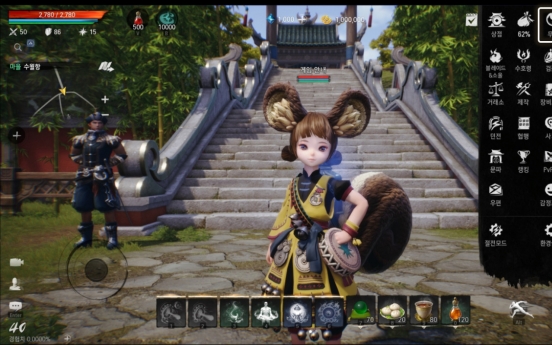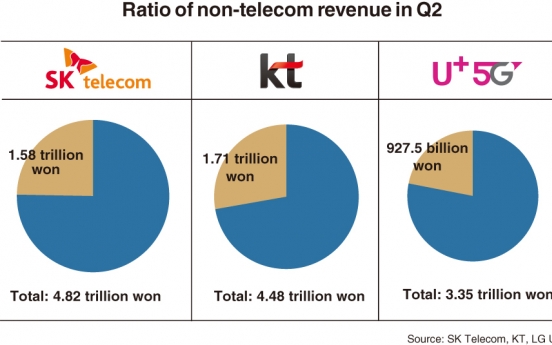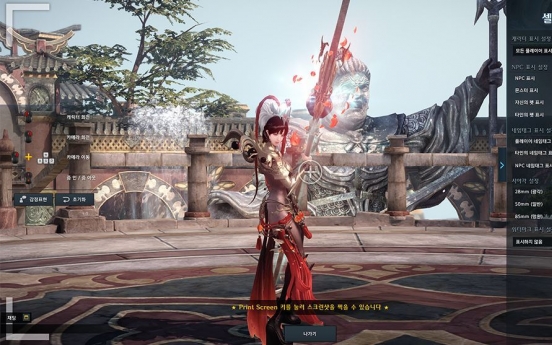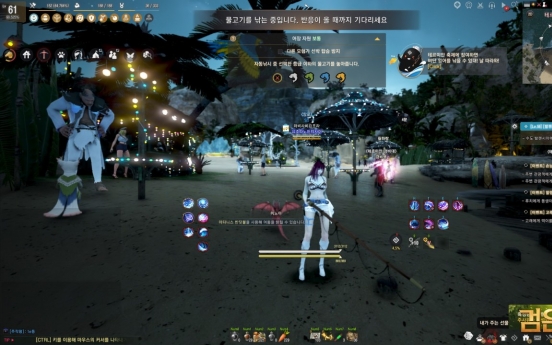Articles by Yang Sung-jin

Yang Sung-jin
insight@heraldcorp.com-
Questions raised over duopoly of Naver and Kakao in platform industry
Last week, South Korea passed a bill aimed at preventing Google and Apple from abusing their app market duopoly, a move that garnered the media spotlight around the world. The so-called “anti-Google bill” revises the Telecommunications Business Act to stop the US-based Google from forcing local app developers to use its own payment system for in-app purchases. Industry watchers said Korean tech heavyweights in dominant market positions are also likely to face similar regulatory
Technology Sept. 6, 2021

-
[Book Review] Prejudice and misinformation against gaming debunked
All work and no play makes Jack a dull boy. Many conservative policymakers and parents in China and South Korea beg to differ: All study and no game playing makes their kids smart boys and girls. Since 2011, Korea has maintained a sort of nightly gaming curfew for youngsters under the “shutdown law.” Amid long-running disputes, the government announced last week it would abolish the regulation. China, meanwhile, stepped up its crackdown on gaming, banning children under the age of
Books Sept. 4, 2021
![[Book Review] Prejudice and misinformation against gaming debunked](//res.heraldm.com/phpwas/restmb_idxmake.php?idx=649&simg=/content/image/2021/09/02/20210902000588_0.jpg&u=20210902172418)
-
Using big data analysis to chart a new course
The top three mobile apps in South Korea -- KakaoTalk, YouTube and Naver -- attracted over 40 million users each in June this year, accounting for the bulk of the country’s population of 52 million, according to data compiled by research firm Mobileindex Insight. The list of popular apps also includes Chrome, a web browser from global search engine Google, Korea’s top online retailer Coupang and popular photo-based social media Instagram, a unit of Facebook. The common thread conn
Technology Sept. 1, 2021

-
Korean gamers take action against NCSoft’s ‘misleading’ marketing
On Thursday, two South Korean game developers had sharply contrasting fortunes on the local stock market: NCSoft’s shares plunged 15.29 percent, while Pearl Abyss shares skyrocketed 25.57 percent. The share price moves of both companies were affected by reactions to their new game titles -- NCSoft’s newly launched mobile role-playing game Blade & Soul 2 and Pearl Abyss’ trailer video for DokeV, an open-world game, whose release date is yet to be announced. The dr
Technology Aug. 30, 2021

-
[Digital Simplicity] Prejudice runs deep against gaming in Korea
Games are like an “electronic fungus” that spreads around the country, posing problems for the education of children. Games are so addictive that they hinder the healthy formation of character and even increase youth crime. In short, gaming is a “hotbed for the derailment of youth.” Those are just a few of the supposedly harmful effects of gaming on children, as described by a local newspaper in 1980. The deeply negative perception about games and their impact on youth
Viewpoints Aug. 28, 2021
![[Digital Simplicity] Prejudice runs deep against gaming in Korea](//res.heraldm.com/phpwas/restmb_idxmake.php?idx=649&simg=/content/image/2021/08/26/20210826000787_0.jpg&u=20210826170824)
-
Netmarble, NCSoft up ante with new mobile games
Netmarble and NCSoft, two of South Korea’s major game developers, are competing for mobile game players with the back-to-back releases of new titles. Netmarble on Wednesday launched action role-playing mobile game Marvel Future Revolution in some 240 countries, including Korea, and early signs were positive as the game shot to No. 1 on the RPG charts on Apple’s App Store in 78 countries, based on prerelease downloads that were made available Tuesday. The first open-world Marvel
Technology Aug. 25, 2021

-
Robots march into more business sectors in Korea
The advent of intelligent humanoid robots depicted in sci-fi films is still thought to be a thing of the distant future, but more South Korean companies in a wide range of industries have begun to adopt simpler robots in a bid to remain competitive in the long term. Not only telecom operators and search engines, but also tech startups that rely on online platforms are rushing to deploy robots in a bid to nurture the long-term potential of robots in connection with artificial intelligence, clo
Technology Aug. 24, 2021

-
Samsung, SK hynix face mixed outlooks for DRAM chips
Last week, foreign investors sold a net 6.3 trillion won ($5.36 billion) worth of Samsung Electronics shares and 2.4 trillion won of SK hynix shares on the local stock market, amid concerns about a drop in DRAM, or dynamic random access memory, chips in the coming months. The continued sell-offs of Samsung and SK hynix by foreign investors weakened their share prices. Samsung’s share price ended at 72,500 won Friday, down 12.9 percent from a recent high of 83,300 won recorded on Aug. 5.
Technology Aug. 23, 2021

-
[Digital Simplicity] Time to rethink the privacy of personal data on mobile devices
Stop to think before you act. This is an incredibly useful advice that can be applied to a number of situations. In an era of ubiquitous mobile devices and platforms, the timeless advice should be modified into a longer, more complex version: Stop to think before you put any “too personal” photos on your phone and cloud storage. Apple, a self-styled champion of privacy, recently surprised many security experts and ordinary users by announcing a software update that is feared to set
Viewpoints Aug. 21, 2021
![[Digital Simplicity] Time to rethink the privacy of personal data on mobile devices](//res.heraldm.com/phpwas/restmb_idxmake.php?idx=649&simg=/content/image/2021/08/19/20210819000809_0.jpg&u=20210819174736)
-
Mobile carriers attempt to expand further beyond telecom business
South Korea’s mobile carriers are adjusting their business strategy to expand their non-telecom businesses in a bid to take a share in the growing demand for digital content delivered via both mobile and fixed-line networks. SK Telecom, KT and LG U+ each witnessed an increase in the share of non-telecom business in their total revenue in the April-June period this year, as more people stayed home and spent time watching video on IPTV and mobile platforms. Top executives of the three ma
Technology Aug. 18, 2021

-
Smilegate’s Lost Ark rewrites rules of online PC game market
Lost Ark, developed by Smilegate, has emerged as the most popular title in the role-playing PC game category in South Korea, a surprising performance given its rise to the top slot took some time and benefited from a host of external factors. The multiplayer game was launched in November 2018. As with other mainstream games, it pulled off a stellar record when it formally kicked off its service, drawing a record 350,000 concurrent users. Over time, its popularity declined as fickle players mi
Technology Aug. 17, 2021

-
[Anniversary Special] Out of sight, out of mind?
For Lee Ji-min (not her real name), a 32-year-old employee at a South Korean gaming company, the shift to working remotely offers clear benefits: no grueling commute and a distraction-free work environment at home. Lee is one of many Korean workers who have switched from office-based work to working from home due to the prolonged COVID-19 pandemic. Although not all Korean companies allow employees to fully work from home, the number of those working remotely has soared as the country has yet
Social Affairs Aug. 12, 2021
![[Anniversary Special] Out of sight, out of mind?](//res.heraldm.com/phpwas/restmb_idxmake.php?idx=649&simg=/content/image/2021/08/12/20210812000926_0.jpg&u=20210812184155)
-
Korea’s PC market expands but growth pace cools in Q2
South Korea’s personal computer market continued to expand in the April-June period of 2021, helped by a solid demand due to the prolonged pandemic, but there were signs that the growth rate would taper off, latest industry data showed. Domestic PC shipments came in at 1.5 million units in the second quarter, up 3.1 percent from a year ago, according to the data from market researcher IDC Korea. The second-quarter PC shipment volume marked a sharp drop from 1.89 million units in the Ja
Technology Aug. 11, 2021

-
8 in 10 job seekers in favor of four-day workweek: survey
The idea of implementing a four-day workweek is gaining favorable views among South Koreans, reflecting the heightened perception of work-life balance and diverse work patterns due to the COVID-19 pandemic, data showed Thursday, In a survey of 4,155 job seekers by human resources service Saramin, 83.6 percent of respondents said they have a positive view of a four-day workweek. The top reason for favoring a four-day workweek was work-life balance (72.4 percent). The idea of work-life balance
Social Affairs Aug. 5, 2021

-
China turns against video games just as Korean firms see signs of thaw
Shares of South Korea’s major game developers and publishers declined on Tuesday after Chinese state media slammed games as “spiritual opium,” highlighting the close link between the two neighboring countries within the global gaming industry as well as risks linked to China’s regulatory whims. The turmoil was sparked by a state-run media outlet in China that published a negative article about gaming and called for stricter controls on “addictive” games. As
Technology Aug. 4, 2021

Most Popular
-
1
Key S. Korean, USFK special operations officials to hold rare meeting amid NK threats

-
2
Jennie, Stray Kids's Met Gala attendance puts them on 'digital guillotine' blacklist

-
3
Controversy brews over shakeup of prosecutors amid probe of first lady

-
4
OpenAI gives ChatGPT new powers to see, hear

-
5
Another suspect behind murder of Korean tourist in Pattaya arrested in Cambodia

-
6
S. Korea to inject $70m into AI-powered public education

-
7
[KH Explains] Naver’s Line dilemma: Lose global footing for cash?
![[KH Explains] Naver’s Line dilemma: Lose global footing for cash?](//res.heraldm.com/phpwas/restmb_idxmake.php?idx=644&simg=/content/image/2024/05/14/20240514050624_0.jpg&u=)
-
8
[Herald Interview] Carbon breakthrough in Korea: Making diamonds at atmospheric pressure
![[Herald Interview] Carbon breakthrough in Korea: Making diamonds at atmospheric pressure](//res.heraldm.com/phpwas/restmb_idxmake.php?idx=644&simg=/content/image/2024/05/14/20240514050559_0.jpg&u=20240514184059)
-
9
Korean industries gauge impact of Biden's steep tariffs on China

-
10
Do Korean doctors make too much money?




![[Book Review] Prejudice and misinformation against gaming debunked](http://res.heraldm.com/phpwas/restmb_idxmake.php?idx=649&simg=/content/image/2021/09/02/20210902000588_0.jpg&u=20210902172418)


![[Digital Simplicity] Prejudice runs deep against gaming in Korea](http://res.heraldm.com/phpwas/restmb_idxmake.php?idx=649&simg=/content/image/2021/08/26/20210826000787_0.jpg&u=20210826170824)



![[Digital Simplicity] Time to rethink the privacy of personal data on mobile devices](http://res.heraldm.com/phpwas/restmb_idxmake.php?idx=649&simg=/content/image/2021/08/19/20210819000809_0.jpg&u=20210819174736)


![[Anniversary Special] Out of sight, out of mind?](http://res.heraldm.com/phpwas/restmb_idxmake.php?idx=649&simg=/content/image/2021/08/12/20210812000926_0.jpg&u=20210812184155)









![[KH Explains] Naver’s Line dilemma: Lose global footing for cash?](http://res.heraldm.com/phpwas/restmb_idxmake.php?idx=644&simg=/content/image/2024/05/14/20240514050624_0.jpg&u=)
![[Herald Interview] Carbon breakthrough in Korea: Making diamonds at atmospheric pressure](http://res.heraldm.com/phpwas/restmb_idxmake.php?idx=644&simg=/content/image/2024/05/14/20240514050559_0.jpg&u=20240514184059)

